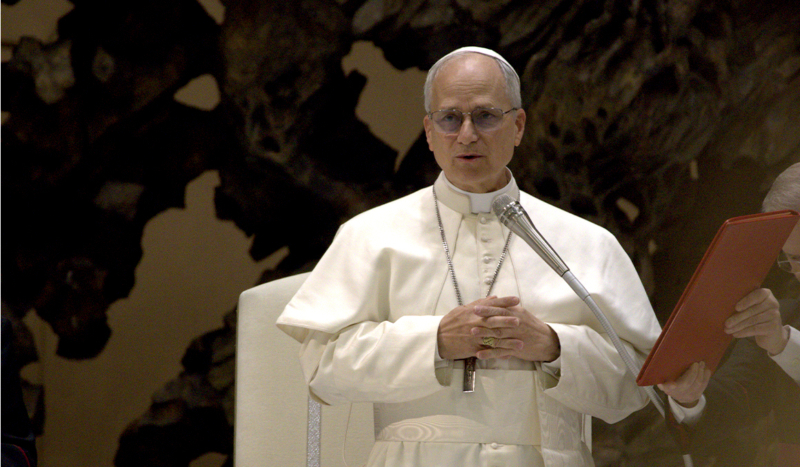
Pope Leo XIV by Edgar Beltrán / Wikimedia Commons
VATICAN CITY // During an audience with pilgrims attending the Jubilee for Eastern Churches May 14, Pope Leo XIV emphasized the Church’s commitment to supporting the traditions and communities of Eastern Catholics, especially those who are being forced from their homelands into the West.
“You are precious in God’s eyes. Looking at you, I think of the diversity of your origins, your glorious history and the bitter sufferings that many of your communities have endured or continue to endure,” Pope Leo said on the morning of May 14, speaking to a full congregation in the Vatican’s Paul VI Audience Hall.
He began the address by sharing the Easter greeting, “Christ is risen. He is truly risen!” and said that he is moved to see the pilgrims in Rome for Jubilee Year 2025, which is grounded in “a hope unshakably grounded in the resurrection of Jesus Christ.”
He reiterated Pope Francis’ message that the Eastern Churches must be cherished and spoke about Pope Leo XIII’s apostolic letter on the Dignity of the Eastern Churches, which emphasized the value of the Eastern liturgies.
Pope Leo XIV said, “In our own day too, many of our Eastern brothers and sisters, including some of you, have been forced to flee their homelands because of war and persecution, instability and poverty, and risk losing not only their native lands, but also, when they reach the West, their religious identity. As a result, with the passing of generations, the priceless heritage of the Eastern Churches is being lost.”
Pope Leo XIV said that the Church today reiterates Pope Leo XIII’s appeal to preserve the Eastern rites and “to preserve and promote the Christian East, especially in the diaspora.”
In the address, Pope Leo XIV also requested the help of the Dicastery for the Eastern Churches to work with him on defining “principles, norms, and guidelines whereby Latin Bishops can concretely support Eastern Catholics in the diaspora in their efforts to preserve their living traditions and thus, by their distinctive witness, to enrich the communities in which they live.”
“The Church needs you,” he continued. “The contribution that the Christian East can offer us today is immense! We have great need to recover the sense of mystery that remains alive in your liturgies, liturgies that engage the human person in his or her entirety, that sing of the beauty of salvation and evoke a sense of wonder at how God’s majesty embraces our human frailty!
“It is likewise important to rediscover, especially in the Christian West, a sense of the primacy of God, the importance of mystagogy and the values so typical of Eastern spirituality: constant intercession, penance, fasting, and weeping for one’s own sins and for those of all humanity (penthos)! It is vital, then, that you preserve your traditions without attenuating them, for the sake perhaps of practicality or convenience, lest they be corrupted by the mentality of consumerism and utilitarianism.”
He also said that amid life’s trials, the faithful must pray “for the grace to see the certainty of Easter” and quoted Saint Isaac of Nineveh, an Eastern Church father who said “the greatest sin is not to believe in the power of the Resurrection.”
“Who, better than you, can sing a song of hope even amid the abyss of violence?” Pope Leo added.
Churches in places such as the Holy Land, Ukraine, Lebanon, Syria, Tigray, and the Caucasus have suffered from intense violence. He said that an appeal rises from these deadly conflicts: “the appeal not so much of the Pope, but of Christ himself, who repeats: ‘Peace be with you!’ And He adds: ‘Peace I leave you; my peace I give to you. I do not give it to you as the world gives it.’”
The Pope also distinguished the peace of Jesus from the tomb-like silence after a war is over; rather it is “a gift that is meant for all, a gift that brings new life.” He urged the faithful to pray for peace, especially in the forms of reconciliation and forgiveness.
Pope Leo reiterated that he is committed to advancing peace to the full extent it is able and that the Vatican stands ready to help bring enemies face to face to bring peace and hope to their peoples. He appealed to world leaders to talk and negotiate, saying that weapons have to be silenced.
“Those who make history are the peacemakers,” he said, “not those who sow seeds of suffering.”
After thanking God for those who are cultivating peace, especially through prayer, Pope Leo expressed gratitude to Him “for those Christians — Eastern and Latin alike — who, above all in the Middle East, persevere and remain in their homelands, resisting the temptation to abandon them. Christians must be given the opportunity, and not just in words, to remain in their native lands with all the rights needed for a secure existence.”
Pope Leo’s full address can be read here.
